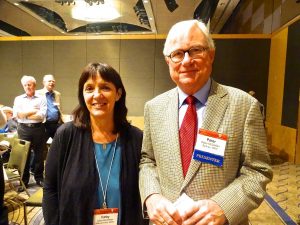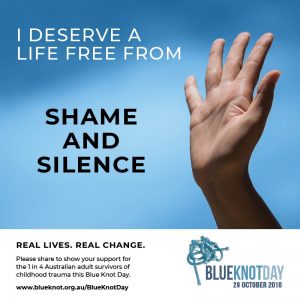
Welcome back. October brings us to the great work of the Blue Knot Foundation, Australia’s National Centre of Excellence for Complex Trauma, with a focus on those who have experienced childhood trauma. Blue Knot Foundation was founded in 1995, as a self-help organisation called ASCA (Advocated for Survivors of Child Abuse). It was developed by survivors for survivors but over its 23 year history has combined the composite voice and passion of survivors with that of academics, clinicians and researchers. It has driven socio-political change advocating for recognition of the needs of complex trauma survivors, primarily as a result of adverse childhood experiences and a trauma-informed world. It has educated the community, and other sectors, around the differences between complex and single incident trauma, in underpinnings, dynamics, impacts and treatment. This includes its leading role in demystifying an understanding of dissociation and dissociative disorders within the mental health, legal and other sectors, led by its Head of Research, Pam Stavropoulos PhD, a member of the Advisory Board of the ISSTD Scientific Committee.
The Foundation is strikingly holistic in its reach, with direct services, training and resources for all areas of society touched by trauma, particularly complex trauma and its recovery. Its 2012 Practice Guidelines for Treatment of Complex Trauma and Trauma Informed Care and Service Delivery were a global first, and have been followed regularly by other accessible evidence and practice-based publications. This includes its 2017 document The Truth of Memory and the Memory of Truth – Different Types of Memory and the Significance of Trauma and multiple factsheets. Whether it be guidance for supporters on how to talk about trauma, training for health professionals and organisations, or direct support for survivors, they’ve got it covered. Sitting down with its President, Dr Cathy Kezelman AM, we explore the theme of ‘spreading the word’ and what it means for the Blue Knot Foundation. “It’s a big part of what this organisation is,” Cathy tells me. “To move forward we need to understand what trauma is and what complex trauma is. There is not a shared understanding, even within the sector.” Cathy elaborates on the importance of understanding complex trauma, as opposed to single-incident trauma, and how it’s not sufficiently reflected in DSM-5. Encouragingly, Complex-PTSD is recognised in the upcoming ICD-11 . Blue Knot Foundation’s mission then, becomes one of education around the complexities and nuances of childhood trauma. For example, developmental and attachment trauma, understood so much better due to advances in neuroscience, can make it hard to seek help and support and build a recovery pathway. Or for many, to know that living freely is an option within reach at all. Cathy comments that a lack of understanding and empathy translates to impatience and judgment, limiting crucial support. “We all want to be treated as human beings – to be and to feel safe, to trust other people, to be believed, to have choices, to work with others, to feel empowered, have a sense of agency, to be understood. “Often society and its members are reluctant to hear the reality of interpersonal events that offend our sense of humanity our expectation of ‘civilised’ societies.
However, abuse, violence and neglect are pervasive realities. As a society we have tried to pretend that abuse doesn’t happen, or that it isn’t so bad – that it is only occasionally perpetuated, and by those who are ‘unbalanced’. But it’s common, and it’s an established social practice. It is time we recognised not just abuse but other traumas which impact our children, adolescents and the adults they become.” Blue Knot’s mission is to educate and promote understanding and cultural change so that our systems of care and justice no longer replicate abusive systems of power, but provide safe respectful spaces in which people can and do recover from diverse traumas.
Blue Knot Day – Monday 29 October 2018
Blue Knot Day is Blue Knot Foundation’s national awareness day celebrated in October every year. On 29th October this year, Australians unite in support of the 1 in 4 Australian adult survivors of childhood trauma. The 2018 Blue Knot Day theme ‘REAL LIVES. REAL CHANGE’ recognises the urgent need for support services for adult survivors of childhood trauma. Coming a week after the national apology to victims of institutional child sexual abuse and within Australia’s mental health month, the timing is opportune. Blue Knot Day brings the conversation home, between friends and with strangers – it makes the topic approachable and visible in our everyday life. We invite you to start the conversation around the world. Here’s how. Download Blue Knot Day social media images from www.blueknot.org.au/BlueKnotDay and share with the hashtag: #unitebkd The tangled blue knot symbolises the complexity of childhood trauma, with blue representing the colour of the sky and a clear sky providing the space for new possibilities. Disseminating Blue Knot’s social media images throughout the month of October using the hashtag: #unitebkd will help spread the critical message.

Do you have something to share? If you’re spreading the word about trauma and dissociation into the wider community, or to other professional groups, then we want to hear from you! Tell us about your work by emailing shua@myune.edu.au Until next time: adios, do good, fly high.

